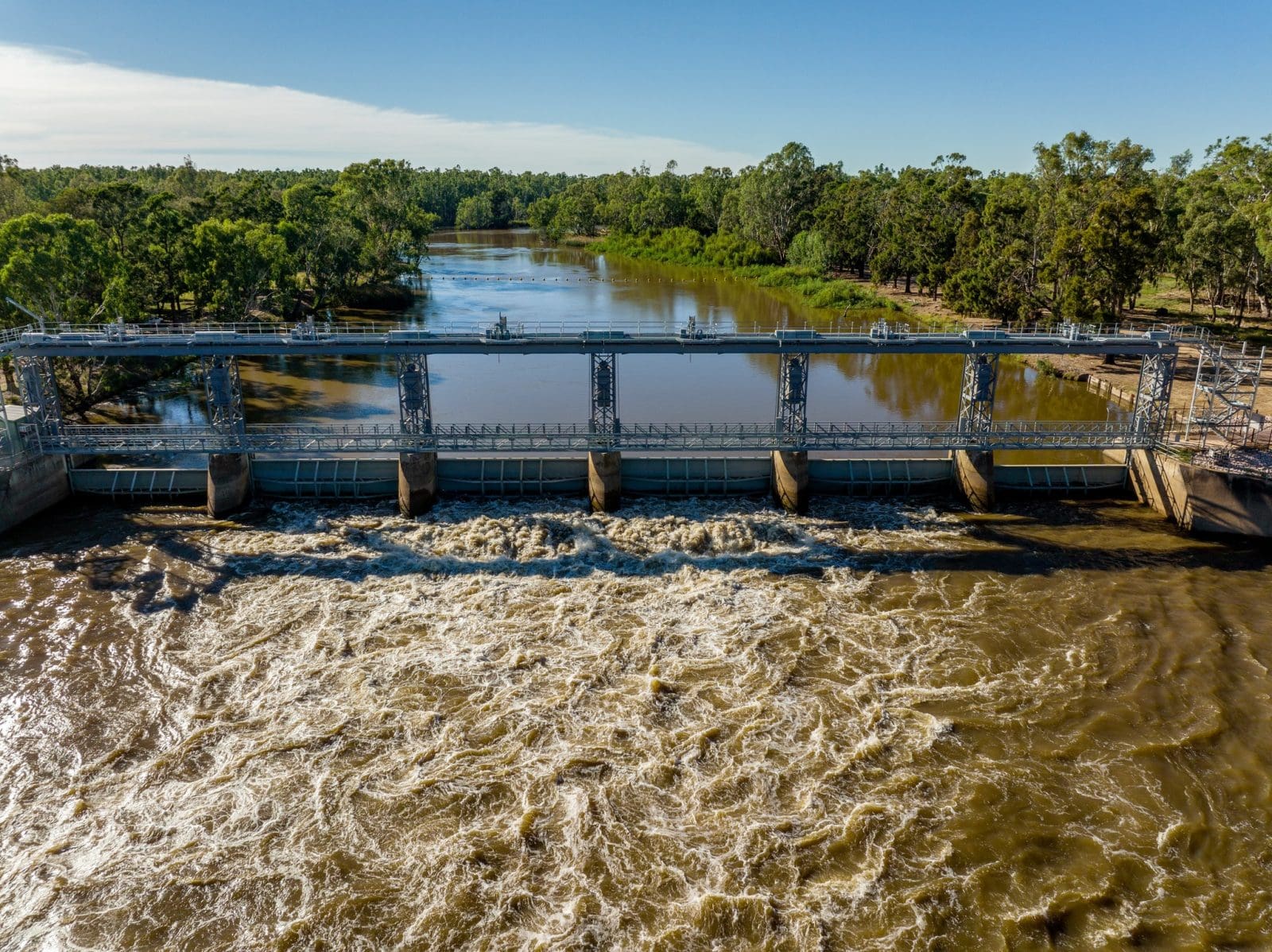
Water flows into the Sturt Canal at Gogelderie Weir between Darlington Point and Narrandera. Photo: Murrumbidgee Irrigation Limited
LOCAL and state governments have joined the chorus of irrigator and farming bodies in voicing their opposition to proposed Murray-Darling Basin water buybacks.
This comes as the bill to formalise the buybacks alongside other changes to the original Basin Plan, Water Amendment (Restoring Our Rivers) Bill 2023, awaits a vote in the Senate.
The bill passed the House of Representatives last month with support from the government and five members of the crossbench.
Since its introduction in September, the bill has drawn criticism from farming bodies and related industries as well as the Liberal and National parties.
The National Farmers’ Federation, NSW Farmers, AgForce Queensland and the NSW Irrigators’ Council held a press conference today warning that the bill would go far beyond the original 2012 plan that sought to balance environmental, social and economic wellbeing.
NFF president David Jochinke said it did not make sense to pursue buybacks when there was a long list of options to improve river health.
“We had environmental experts, farmers and governments all on the same page with the Basin Plan; now that is down the drain thanks to the government’s tunnel vision on buybacks,” Mr Jochinke said.
As a representative of the largest MDB agricultural water user, Cotton Australia is vehemently opposed to buybacks.
“Buybacks are destructive to irrigation communities as they take away the productive capacity of the water without any offsetting from greater efficiency through on-farm or off-farm efficiency projects,” Cotton Australia said in a submission to an inquiry into the bill.
Cotton Australia argued that “in cotton the removal of each 700 megalitres of water” would cost one full-time job, which would result in the loss of supply-chain roles and flow through into a reduction of services to rural communities.
“I’m not sure [Minister for the Environment and Water Tanya Plibersek] truly grasps the impact of this bill and what water buybacks will do to the agricultural sector, and the small businesses, many of them family farms, that help feed and clothe Australians,” Cotton Australia general manager Michael Murray said.

RGA president Peter Herrmann
“I am also very concerned that all the alternatives to buybacks, submitted to the government for consideration by farming and irrigation bodies at their invitation, have apparently been ignored.”
Ricegrowers’ Association of Australia and SunRice questioned whether the potential impact on communities would be worth the touted environmental benefits.
“The water buybacks and omission of socio-economic protections in the proposed bill will have an irrevocable impact on not only the agriculture industry but countless rural communities,” RGA president Peter Herrmann said.
“We need the Senators to understand the significance of that.”
Governments fight bill
Irrigated agriculture organisations were not alone in their criticism of the bill, with local and state governments also voicing their concerns of water buybacks.

Victorian Minister for Water Harriet Shing. Photo: VicWater
Representatives from the Labor governments of New South Wales and Victoria also spoke out against the bill.
Vic Government Minister for Water Harriet Shing said “buybacks do real harm” by leading “to very significant job losses” and “very significant hardships across communities”.
NSW Premier Chris Minns told parliament that the government “[does] not support water buybacks”.
“The Australian Government’s water recovery targets must take place through infrastructure diversion projects and other investments,” Mr Minns said.
Notably, the Qld Department of Regional Development, Manufacturing and Water and the South Australian Government support the proposed buybacks.
Federal decision
Despite these calls from two of the four Basin states, Minister Plibersek said she does not need the states’ backing to push forward with the bill.
“I don’t need them to do voluntary water purchase, but I want them as part of this,” Ms Plibersek told ABC Broken Hill last month.
“The problem with their position is by not signing up they miss out on more time, more money, and they don’t, I mean, I will still buy water…so their position is completely illogical, but that’s a matter for them.”
On-ground support
Ms Plibersek argued that there was support for buybacks from growers and Basin communities that wasn’t represented by industry groups.
She said Department of Climate Change, the Environment and Water opened tenders to purchase 44.3 gigalitres per year from water right holders in six catchments across New South Wales and southern Queensland.
It received around 250 responses, totaling more than double the amount of water required under the tender.
She said the strength of this response signals to governments and communities that voluntary water purchase is a necessary and feasible tool to help meet the targets of the Murray-Darling Basin Plan.
“What this shows is that there are many willing sellers who are prepared to work with the Government to make sure we have enough water to deliver a healthy and sustainable river system.”
More information needed
Several farming bodies and agribusinesses are urging for passage of the Bill be delayed until more research into the potential impacts of buybacks can be completed and reviewed.
“We strongly believe that the Federal Government should undertake a thorough analysis of the direct and indirect employment, gross domestic product, export and consequential supply chain impacts of this Bill,” SunRice Group submission said.
This was supported by Regional Development Australia – Riverina which called for a “comprehensive impact assessment” and more engagement with local stakeholders.
Irrigators currently await a report from the Senate Standing Committees on Environment and Communications into the Bill.
The report be considered by Senators before a vote on the Bill.
Cotton was the largest user of Murray Darling Basin water, in terms of volume, with 1.22 million megalitres applied in 2020-21 across 181,284 hectares, according to ABS data.
This was followed by fruit and nut trees at almost 800,000ML.
Rice applied 530,000ML in 2020-21 across 43,700ha, giving the crop the highest application rate at 12.1 megalitres per hectare in 2020-21.
Get our free news straight to your inbox – Click here

HAVE YOUR SAY